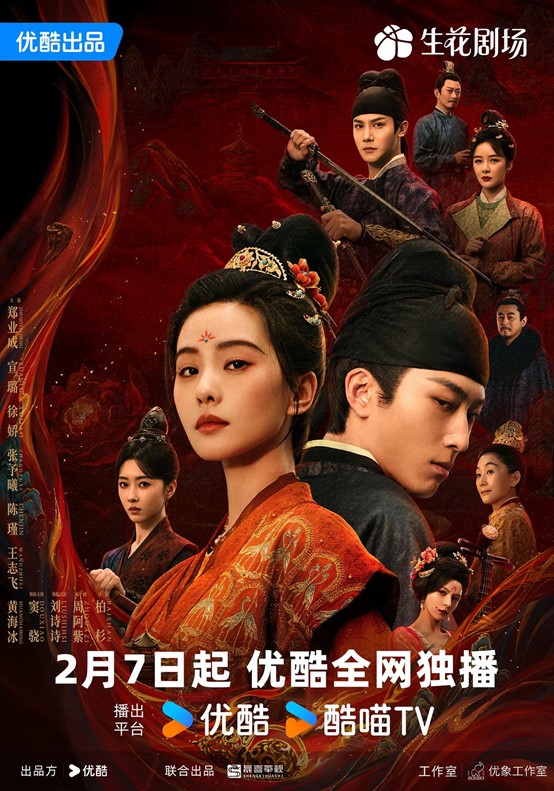
Two years ago, screenwriter Weng Liangping sought to create a work to commemorate the 75th anniversary of the founding of the People's Republic of China. He focused on the tumultuous year of 1949, a time of transition and great change. In the newly liberated cities of China, particularly represented by Shanghai, society faced numerous challenges, with spies and bandits rampant and urban order in desperate need of maintenance. "The old world had just been shattered, and the new world was only just beginning, still in a state of great disarray." The first generation of public security officers played a crucial role during this time, and their stories became the inspiration behind Weng Liangping's creation, leading to the television drama "Night and Dawn."

Poster of "Night and Dawn"
In order to authentically portray the stories of the first generation of public security officers, Weng Liangping invested tremendous effort. He delved into a wealth of resources, from various documents about old Shanghai to valuable materials housed in the Shanghai Public Security Museum, including case records, vehicle information, and relevant books such as "War in Shanghai," "Chronicles of Shanghai Public Security," and historical materials from the early days of Shanghai's liberation. He aimed to depict the true faces of law enforcement personnel from that era and the thrilling stories they experienced.
Throughout the scriptwriting process, Weng Liangping stated that the most significant challenge was not the writing itself but the planning phase. How could he find innovative storytelling themes, angles, and methods within the saturated genre of espionage? Ultimately, he chose to focus on public security because it offered both the thrilling excitement of counter-spy stories and the idealistic sentiment of protecting the people. But how could he bridge historical themes with contemporary audiences? After a lengthy process of reflection and planning, he identified a young character, Lin Shaobai, whose transformation from an old police officer to a new public security officer, as well as his re-discovery of core values, laid a solid foundation for the script.

Still from "Night and Dawn"
Weng Liangping's oeuvre includes several historical works, and his projects "Questions of the Vastness," "The Chaser," and "Night and Dawn," which aired from last year to this year, all received positive market responses and industry acclaim. Regarding creation in this genre, he believes that respect for history and authenticity, meticulous character development, profound thematic exploration, and keen insight into market trends are all indispensable elements.
In the story of "Night and Dawn," he frankly stated that what he most wanted to convey was “original intention and faith.” To him, the character Lin Shaobai's growth represents a story of reclaiming one's original intention: he aspires to be the city’s “strong shield.” Moreover, he firmly believes, “Those with faith are fearless; those with faith have roots in everything they do; and those with faith, even when facing immense difficulties, will find a sense of happiness.”

Still from "Night and Dawn"
[Dialogue]
From Old Police Officers to New Public Security: Reclaiming Original Intention
The Paper: Lin Shaobai is a relatively unique protagonist; he starts off as a rather self-serving and evasive character. Especially memorable is a moment in the first episode where he rides through a crowd in his police uniform without intervening in the chaos of looting and destruction. Such a portrayal of a main character is rare. How did you approach crafting this character?
Weng Liangping: The growth arc of a character is indeed appealing and tense. Through the series, we witness Lin Shaobai's development over the course of the year from 1949 to 1950.
On the eve of Shanghai's liberation, the chaotic situation is something Lin Shaobai had become desensitized to. Observing such events, one would expect a modern police officer to intervene, but at that time, when he was an officer himself, he was uncertain of his own fate, so he chose not to act amidst the chaos on the streets. Moreover, at that time before liberation, the police were contemptuously referred to by the public as "wolf-skin dogs," "black-skin dogs," or "wolf dogs," revealing their poor reputation.

Chen Zheyuan as Lin Shaobai
Lin Shaobai originally had aspirations; he wanted to be the city's “strong shield,” but after facing numerous injustices and profound disappointments with the upper echelons of the Kuomintang and the system, his resolve wavered. Witnessing the chaos on the streets before liberation, he felt deep sorrow but felt powerless to change the deteriorating environment.
However, post-liberation, upon joining the Public Security Bureau, Lin truly experienced the significant changes brought about by the new government under the Communist Party's leadership. He began to wholeheartedly support this regime, especially when his mentor inspired him with the notion of "standing against darkness to guard the light," reinforcing his belief that being the city's strong shield was meaningful, thus gradually reclaiming his original intention and professional dignity.
The Paper: What was the biggest difficulty you encountered in the entire concept and formation of the script?
Weng Liangping: The actual creation of the script, which began at the end of 2021, went relatively smoothly. I believe the greatest challenge lay in the initial planning phase. For example, which industry to focus on? The decision to write about public security stemmed from its thrilling counter-spy stories and the ideal of protecting the people. But from which angle should we approach public security? How do we make historical themes resonate with contemporary audiences?
The time spent in reflection and planning on these aspects was the longest. Eventually, I found the story of Lin Shaobai, who transitions from being an old police officer to a new public security officer within that year, as well as his central theme of reclaiming original intention, which made the writing process much faster. Particularly, establishing the core relationship between the characters Lu Zhengyang and Lin Shaobai, one an old police officer and the other a new public security officer, who are both distinct and complementary, allowed them to work together to solve espionage cases.

Still from "Night and Dawn"
The Paper: What are your thoughts on Chen Zheyuan's performance in this series?
Weng Liangping: I believe Chen Zheyuan showed significant growth and improvement in this role. Previously, he mostly acted in romantic idol dramas, but this time, portraying Lin Shaobai, he starts off presenting as a Shanghai local with connections to various walks of life. His character is quite lively and clever. Honestly, such roles can be challenging: if overplayed, audiences may find them over-the-top, while if underplayed, they may come across as unconvincing. There is a fine balance to strike here. He performed well, and as the scenes progressed, he became increasingly engrossed in the role.
Another commendable aspect is that he captured the relaxed demeanor and sense of security of a local Shanghainese. While acting alongside seasoned performers, he remained unflustered, embodying Lin Shaobai's confidence of “having lived here for many years.” This is quite remarkable.
"Night and Dawn" Emphasizes Strong Plot and Twists
The Paper: From late last year to this year, three of your historical works have been aired, including "Questions of the Vastness," "The Chaser," and "Night and Dawn." Can you discuss the unique highlights of these three works and your creative thoughts behind them?
Weng Liangping: "Questions of the Vastness" tells the story of Chairman Mao from 1921 to 1927. The central tone established with Teacher Liang Zhenhua and others was about the young Mao finding his direction in life during those seven years. "The Chaser" focuses on a small character, Wei Ruolai, an ordinary bank employee, finding his life's beliefs. "Night and Dawn," in contrast, revolves around the themes of reclaiming original intention and faith.

Still from "Night and Dawn"
Of course, all three share the common themes of growth and pursuit, but "Night and Dawn" may be more genre-specific, emphasizing strong plots and twists.
Additionally, I experimented with multi-threaded storytelling this time. Besides the main storyline represented by the characters Lu Zhengyang and Lin Shaobai, as well as the counter-spy characters Zheng Lanting, Wang Liqun, and Xu Wei, there is a third narrative line represented by the gray area character Jin Maochang. This approach aims to explore how to achieve unity towards a common goal while navigating through these parallel storylines.

Still from "Night and Dawn"
The Paper: The espionage genre is a uniquely Chinese market segment that poses challenges for innovation. How do you see the value and significance of the espionage genre in today's market? What do you think is the key attraction for audiences?
Weng Liangping: Indeed, innovating within the espionage genre is challenging. My personal view is that to innovate in espionage storytelling, one must focus beyond merely the twists and turns of the plot. The storytelling cannot solely revolve around how to construct unexpected moments or suspenseful elements, as those are just techniques. The focus should be more on establishing the characters, as well as their fates and choices, which allows for deeper audience connection. This approach may lead to innovative direction.
Espionage dramas have always been appealing to a general audience, attracting many viewers, especially older generations who may not be as active online and prefer to watch on traditional TVs. There is a strong intrigue here, primarily because characters in espionage dramas often find themselves in crisis situations, inherently generating dramatic tension and concern for character outcomes.

Nie Yuan as Lu Zhengyang
Long-form Video Encourages Empathy Over Merely Providing Thrills
The Paper: You mentioned that the strong plots and intensity of espionage dramas are the main attractions for viewers. Short dramas are also competing for audience attention with their brisk plotlines and pacing. What are your thoughts on short dramas?
Weng Liangping: Indeed, the rise of short dramas, particularly on platforms like Douyin, presents a challenge to long-form video. The pacing of short videos is swift and typically omits long processes. I have noticed that contemporary audiences tend to prefer faster pacing and dislike drawn-out sequences. With the abundance of content available, if you tell a story with outdated methods, viewers can quickly anticipate plot developments, leading to a loss of patience.
However, long-form video has its advantages; it can present characters’ emotions, feelings, and growth more comprehensively, fostering audience empathy rather than just offering superficial thrills. For instance, something like "A World Between Us" allows everyone to see reflections of their own families, while "My Ali Tai" maintains a slower pace yet still comforts viewers. Thus, it's not about pursuing speed for its own sake; whether creating long or short videos, connecting with the audience’s thoughts and emotions is paramount.
The Paper: Television dramas are products of mass culture, but the market has been increasingly segmented in recent years. How do you think a series can reach the broadest audience and become widely appealing?
<

